

|
|
|
|
|
|
|
|
|---|
Interview with Pierre Schunck (NIOD)
--1--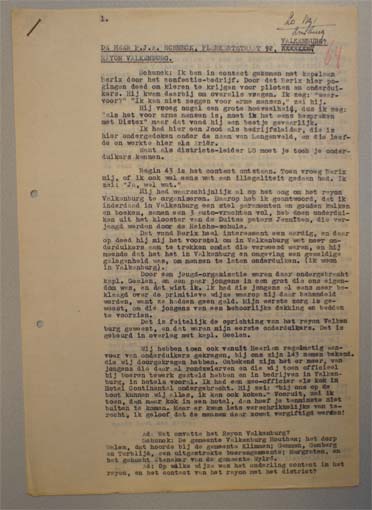
--1--
DE HEER PJA SCHUNCK, PLENKERTSTRAAT 92, VALKENBURG, RAYON VALKENBURG
Schunck: I got in contact with chaplain Berix by the company. Because Berix tried to get clothing for (allied) pilots and divers here. He asked for overalls. I say: „Whom for?“ „I can not say for whom. Just for poor people“, he said.
He asked for a rather large quantity, so I say: „If it is for the poor, I have to discuss that with Distex.“ But he found that a bit dangerous.
I had a Jew as a manager here, who was hiding under the name Langeveld, and he lived here as an Aryan. [Want] als districtsleider L.O. moet je toch je onderduikers kennen. (Pierre Schunck was rayonleider, niet districtsleider. Wie is hier bedoeld? Berix? More about Jan Langeveld in another interview with Pierre Schunck, with the Auschwitz committee)

Giel Berix
We had the first contact in the beginning of ’43. Then, Berix asked me, if I did ever something illegal. I said: "Yes, a bit. "
He probably had already the plan to organize the subdistrict of Valkenburg. I replied that I actually brought underground some paraments and golden chalices and books from the monastery of the German Jesuits in Valkenburg, who were driven out by the Reichsschule (school of the SS) , put together some car loads.
Berix found all that very interesting and nice and then he gave me the proposal to bring more people to Valkenburg, because he assumed that there were good opportunities to hide people in Valkenburg and surroundings. (I live in Valkenburg).
In fact, that was the foundation of the rayon Valkenburg and they were my first divers. (Here Pierre Schunck leaves the Dutch soldiers out of consideration, that he sent on their way home in the first days of the occupation after they had been waiting for a while in Valkenburg on the tourist season. See interview Nederlands Auschwitz Comité) This was done in consultation with chaplain Geelen.
From Heerlen we also got regular supply of divers. 143 Names are known with us, of people we got from there. There’s more unknown names, of guys who already roamed about and whom we gave official work with farmers and businesses in Valkenburg, particularly in hotels. I had a ship’s officer as chef in the Hotel Continental. He said: „We on the ship can do anything. I can cook too.“ „OK,“ I said, „then you’ll be cook in a hotel. That way you at least will have no need to go outside.“ But just a terrible thing came out of tis. I was told that the people there were almost poisoned!
Ad: What was the subdistrict of Valkenburg consisting of?
Schunck: Of the municipality of Valkenburg-Houthem; the village of Walem, that belonged to the municipality of Klimmen; Geulhem (municipality of Berg en Terblijt); a part of Margraten, and the hamlet of [Schoonbron] in the municipality of Wylré.
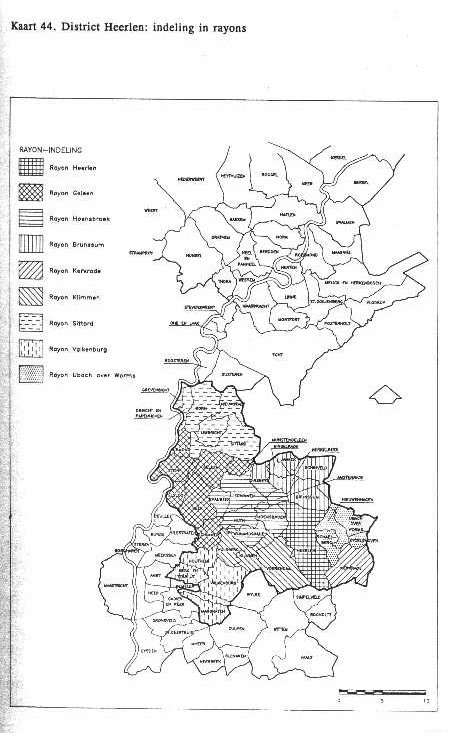
Ad: How did the internal contact of the rayon work and the contact of the rayon with the district?
--2--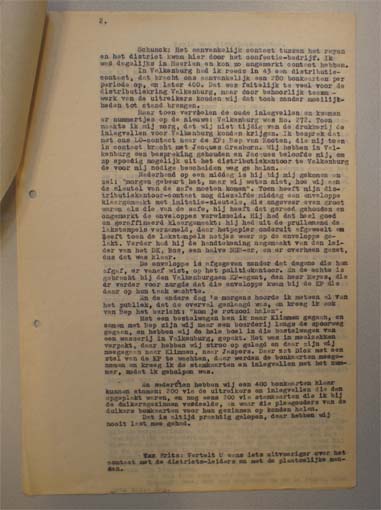
--2--
Schunck: The resulting contact between the rayon of Valkenburg and the district of Heerlen was uncomplicated, because I was in Heerlen at work every day.
I had a contact at the distribution office in Valkenburg in ’43. That generated initially about 200 ration cards per period, and later 400. In fact that was too much for the distribution in Valkenburg, but by proper teamwork of the distributors, we could still handle that without difficulty.
Then the old insert sheets became invalid and there came numbers on the new ones: Valkenburg was N° [272]. So I was worried that we would get the insert sheets for Valkenburg in time from the printer. I discussed that with our L.O. contact within the K.P.: Bep van Kooten (sabotage specialist of the K.P., later commander of the „Stoottroepen Limburg“, see L. de Jong), who referred me to Jacques Crasborn (K.P. district of Heerlen, that Valkenburg belonged to. The K.P. was the „armed wing“ of the resistance.) We met in Valkenburg and Jacques promised to me to get the needed papers from the distribution office in Valkenburg for me as soon as possible.
Later he (Crasborn) came to me one afternoon and said: „Tomorrow it will happen, but we don’t know how we can get the key of the safe“. So on the same afternoon my contact at the distribution office (Willem Freysen) prepared an envelope with keys, which were about the same size as those of the safe. He had them ready and he swapped the envelopes unnoticed. He had prepared it very well and cleverly: he had collected from the trash the wax seals, soaked off the paper under them and he then glued the wax seals neatly on the new envelope. Also he forged the signature of the DK [??], a sympathizer of the N.S.B., and put it on the seal. So that was perfect.
The envelope was issued at the police station and the person who brought it there, didn’t suspect anything. The real one has been brought to the K.P. agent Meys of Valkenburg, who ensured that the K.P. got it, which was waiting for their task.
Next morning I heard already in the street, that the attack had been successful, and I got the message from Bep: „Come and get your crap“.
I went to Klimmen with a van, and together with Bep we went to a farm along the railroad, and we loaded the whole shebang into that van of the laundry. It was packed in flour bags, we put straw on it and so we went to Klimmen, to Jaspers. There [????] waited with a bunch of the KP. They took the ration cards and I got the stamkaarten (master cards) and insert sheets with the number, so I was helped too.
This way we could prepare 400 ration cards; 200 over the distributors. And insert sheets, which were glued on, and another 100 over master cards which I share out between die Taucherfamilien aufteilte the host families and where the „parents“ of the divers could get ration cards for their families.
That was always wonderful, we never had trouble with that.
Frits: Vertelt U eens iets uitvoeriger over het contact met de districts-leiders en met de plaatselijke mensen. (Berix was districts-leider.)
--3--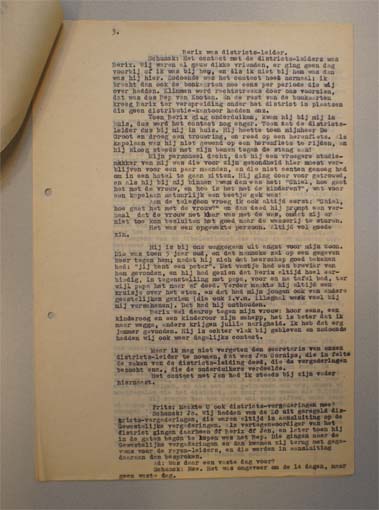
--3--
Schunck: The contact with the leaders of the district was Berix. Soon we were close friends, not a day passed that we didn’t see each other. This way, the contact was quite easy. So once per period I brought him our remaining ration cards. Klimmen was supplied directly by us, that was Bep van Kooten’s village. And Berix got the rest of the ration cards for distribution on places in the district that had no distribution office. [???].
When he had to go into hiding, Berix moved to me, so the contact grew still closer. So now the district leader lived in my house. He was called Mr de Groot now and wore a wedding ring, and ran a men’s bicycle. As a chaplain he was not used to drive a men’s bicycle and he always beat his legs against the rod!
My staff thought he was an old study partner of mine who had to stay here some months for his health, and had not enough money for a hotel. He was regarded as being married and when he came in with me, then it went: „Giel, how are your wife and children?“, what was of course a bit weird for a chaplain.
Also on the phone, I asked first: „Giel, how’s your wife?“ and then he told a story that his wife just finished the washing, and that she could not force herself to bring it to the laundry.
He was a cheerful person, always full of good humor.
He left us for fear of my son. Who was 5 years old, and this little guy once said to him, after having watched him exactly: „You are a priest!“ He had found a Breviary prayer book of Berix, and he had seen that he prayed, in contrast to dad, always very reverentially before and after the meal, while his father just did it. He also blessed the food always, and my boy had observed this when other priests (who were often with me also because of illegal work). He had remembered that.
After that Berix said to my wife: „Look, a children’s eye and a child’s ear are sharp. I should go, otherwise you just would get into trouble.“ I strongly regretted this. However he remained in the vicinity and so we still stood in daily contact.
(Giel Berix did not survive the war. Dressed like a non-cleric and with fake identity card, he attended 21th june 1944 a top meeting of the province L.O. in Weert. This meeting was betrayed by a man called Vos. Berix and 8 comrades were arrested and brought to the concentration camp of Bergen-Belsen, which they did not survive. Berix died of typhoid fever.
Source http://users.cuci.nl/smcwfs/projecten/protest/DARTIKEL/DH11A.HTM)
Here I should not forget the secretary of our district leader, Jan Cornips, who basically dealt with the daily affairs of the district top, who attended the sessions etc., who divided the divers.
The contact with Jan, I always had at his father’s [???].
Frits: Maakte U ook districts-vergaderingen mee?
Schunck: Yes. We regularly had L.O. meetings at district level, which took place directly after the province meeting. Went as a representative of the district either Berix or Jan, and later, when he began to be noticed, it was [?]. They went to the province meetings and then they came back with data for the rayon leaders and they were discussed then.
Ad: Was there a fixed day for this?
Schunck: No. It was about every two weeks, but no fixed date.
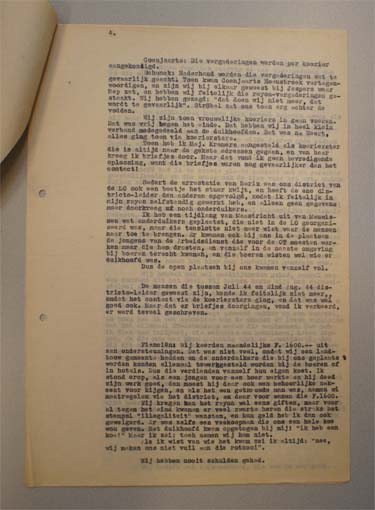
--4--
Coenjaerts: Those meetings were announced by courier. (Cammaert writes: „G.H.H. Coenjaarts, who worked in the Office of the State Mines, stole over a thousand business cards for divers. He printed illegal pamphlets and even books at the mine. In the summer of 1944, he threatened to fly up. The entire management of the subdistrict of Heerlen went underground. In the last months of the war Coenjaarts acted as a principal collaborator in Goossens intelligence service in the rayon.“ Is that the same person?)
Schunck: Later, these meetings were considered a bit too dangerous. At that time Coenjaerts came to stand in for [??], and we met at Jaspers’. Bep van Kooten from Klimmen was there too. In fact we stopped the meetings of the rayon. We said: "We won’t do this anymore, it’s too dangerous". Ströbel (Chief of the SD =security service of the SS in Maastricht ) was then pretty much behind us.
We introduced female couriers. Then the war was nearly over. We communicated that to the heads of the diving cells in the very small circle. That was in Weert, everything went then via female couriers.
hen I assigned Ms Cremers (Wielke Cremers, sister-in-law of Pierre Schunck) as a courier. She cycled to the most high-risk addresses and from her I got notifications on slips of paper. But I found that not a satisfactory solution, because these notes were even more dangerous than the contacts (themselves)!
Since the arrest of Berix, our L.O. district was a bit disoriented. One district leader followed the other. So in fact I had to work in my district indepedantly, I just got no more data and also no divers.
For a while I accommodated some divers from Maastricht, sent by M[emmisman], who was not organized in the L.O., and who finally no longer knew where to go with the people… And there still were the boys who ran away from the Arbeitsdienst (forced labour service) , that had to work for the O.T. (Organisation Todt) , and who went by themselves to farmers in the immediate vicinity. Then these farmers knew who was the (responsible) head of the diving cell.
So our open places were automatically occupied again.
In fact I no longer knew the people who were district leader between July ’44 and end of Aug ’44, because we stood in contact via couriers, and that was a good thing. But I found it wrong that notes were exchanged. People wrote too much.
We monthly allocated ƒ1600 of supports. That was not much, because we had an agricultural municipality and divers, who were accommodated in our subdistrict could work at farms or in hotels. So, of course, they earned their own living. I insisted that if a boy worked for a farmer and he did a good job, then he should get a proper pocket money for it, and if he was a married man, we took measures via the district and that were these ƒ1600,-- for.
In the subdistrict we sometimes received gifts. But especially towards the end of the war, there were a lot of black-marketeers, who eagerly wanted a stamp „for the resistance“. I refused that money. There was even a cattle-dealer, who wanted to give ƒ100,000. The head of that diver cell came to me and cheered: „I’ve got ƒ100,000!“
But I said: „And yet we can’t take that“.
If I did not know from whom it came, I always said: „No, we’ll not soil ourselves with this filth“.
We have never had any debt.
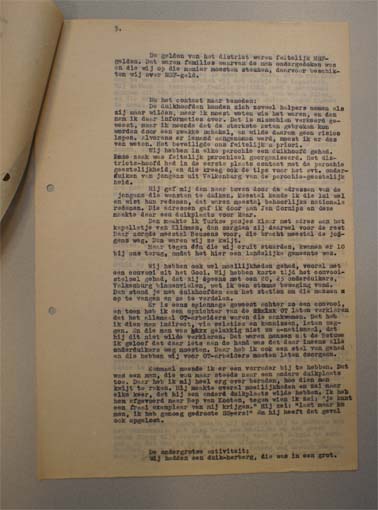
--5--
De gelden van het district waren feitelijk [MOF]-gelden. Dat waren families waarvan de man ondergedoken was en die wij op die manier moesten steunen, daarvoor beschikten wij over [MOF]-geld.
En het contact naar beneden:
The heads of the diver cells could take so many helpers, as they wanted to, but I had to know who it was, and then I inquired about them. This may have been wrong, but I thought that the strongest chain can be broken by a weak link and so I didn’t want to take any risk. Before anyone was given a job, I had to know about it. In fact, that protected us from the outset.
Each parish was a diver cell. Our thing was organized by parish. The district leader first had contact with the clergy of the parish, and he got the tips about any going underground of boys from Valkenburg from the parish clergy.
Then he (the head of the diver cell) gave me the addresses of the guys who wanted to dive. Usually, I already knew the boys and knew about their reasons. These were mostly good national reasons. I gave these addresses to Jan Cornips and then he prepared a diving place for them.
Then I prepared Turkish passports [and brought them to the] chapel in Klimmen, and they would take care of the rest. Usually it was [Bessems], who did so. Normally it was him who brought the guys away. Then we had got rid of them.
But on one we accommodated, 10 new came in, because it was a rural community here.
Sometimes we had some problems, especially with a convoy from the region of Hilversum. For a short while we had a convoy system, so that they suddenly invaded Valkenburg with 20 to 25 divers simultaneously, which in my opinion was a stupid method. Then I stood there with the heads of the diver cells at the train station to receive the men and to share them out between the diving places.
There was espionage behind one of these convoys. Then I made a supervisor of the O.T. (Organisation Todt) have a declare, that they all were OT workers, who came up with. I made this man say that indirectly, around some corners. And this man happened to be not so un-national, that he would not declare this. These were people from the Betuwe. I think that something was going on there, so suddenly all divers had to disappear. I got some of them too, and we had to pass them off as O.T. workers.
Once I believed to have a traitor here. This was a man, who always just wanted to hide somewhere else. So I brooded how to get rid of this man. He constantly made trouble and said every time he wanted to have another hiding place. I got him to Bep van Kooten, I said to him: „I can give you a nice specimen.“ He said: „Just let him come, I have got enough deserted [*]!“ And he solved this case.
Pierre Schunck puts it here briefly and almost cheerful. At home he spoke differently about this. They had this man lying heavy on their stomach. Most of the resistance people in Limburg were convinced and principled Christians who took seriously the 5th commandment. But on the other hand they were in war, and this man was probably an enemy. So martial law and the principle of self-defense was valid here. And the K.P. as „armed arm“ had to solve it. That was of course totally different from the actions of „Bijltjesdag“ (day of reckoning) after the liberation of which the L.O. dissociated itself. A.S.
°°The underground activity:
We had a Diver’s Inn, which was in a cave.
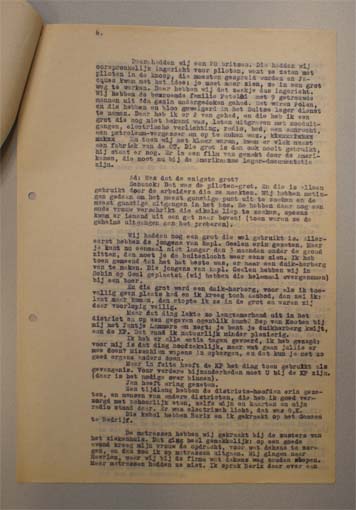
--6--
There, we had about 20 flatbeds. We originally designed the whole thing for pilots because the pilots were a problem for us. They had to be dispersed, and someone came up with the idea: „Why don’t we hide them in a cave?“ We set up this thing then. We had the famous family F[**] in there with 9 married men from the same parents. They came from Poland, and they refused en-bloc to report to the German army. Of which I myself had 7. I made them dig out a cave that was not yet known. With emergency exits, electrical lighting, radio, bath, a sink, a paraffin stove for cooking etc.
En toen wij net klaar waren, kwam er vlak naast een fabriek van de OT. Die grot is dan ook nooit gebruikt, hij staat er nog. Er is een film van gemaakt door de Amerikanen, die moet nog bij de Amerikaanse leger-documentatie zijn.
Ad: Was that the only cave?
Schunck: This was the pilot’s cave. It is used only by the workers who set it up. We measured the cave to find out the most convenient point for an exit to the forest. We shocked there an old woman who was searching for acorns. Suddenly someone came out off a hole upwards! (We were trying out secret exits).
We had another cave that we really used. First the guys of chaplain Geelen were in there. But you can not stay longer than three months under the earth, then you have to go again into the fresh air. So in my opinion it would the best idea, to install a diver’s inn there. We accommodated the guys of chaplain Geelen in Schin op Geul at a farm (we took them over completely).
So the cave became a diver’s inn, and if I happened to have no place free and I got but new entries, then I said: „Just let them come“, then I put them in the cave, and they were sure for a while.
But the thing gradually had leaked out into the district. So one day Bep van Kooten comes to me with Jantje [Lemmens] and says: „You lost your diver’s inn, to the K.P.“. I was of course not very amused.
I undertook all possible actions against it. I said: „For me, that thing is necessary. But what are you going to do with it? Maybe storing weapons? You could do that just as well elsewhere.“
But in fact the K.P. used the thing as a prison. For more details, you must contact the K.P. (There a lot about it is known).
Jan has been in there.
The district leaders lived there for a while, and people from other districts.
I provided them well with decent food, even wine and playing cards and my radio stood ready. There was electric light, that was all right.
Berix and I organized the needed cable at the muncipal services. (In the interview with the Auschwitz Committee, he speaks of a cable from the mine Oranje-Nassau. Possibly, they did not have enough with one cable, because the distance to the switch cabinet was too long.)
We organized the mattresses with the nuns of the hospital. That was easy! One evening my wife got an order for blankets and so I went looking for mattresses as well. We went to Heerlen, where we were able to take some blankets at the company (Fa. A.Schunck). But they had no mattresses. I talked about it with Berix
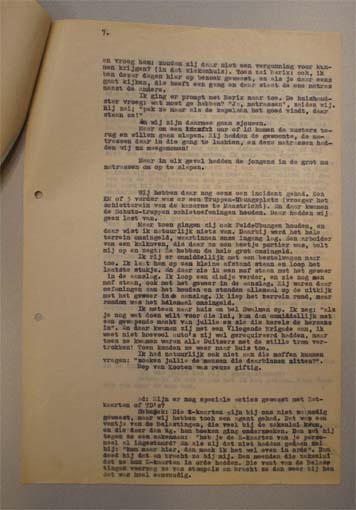
--7--
and asked him, „Couldn’t we get a licence for that in the hospital?“. Then Berix said: „I was there for a visit some days ago, and if you look around there, there is a hallway and there is one mattress next to the other.“
I went there immediately with Berix. The housekeeping nun asked: „What do you want?“ „Well, mattresses“ we said. She said: „Just take them if the chaplain says it is all right. There they are!“
And we started to carry them away.
But at about ten o’clock the sisters came back and wanted to go to bed. They used to air the mattresses on the floor and we had taken them now!
But in any case, the boys in the cave had mattresses to the sleep on now.
Once we had an incident there (at the cave). About 5 kilometres away there was a military training area (formerly shooting site of the barracks in Maastricht). And since the German army arrived to do target practice. We had no trouble with that.
But then they began to do field exercises as well and of course I didn’t know about that. The whole area was surrounded, also the entrances of our caves. A worker at the lime kiln, which was there a bit porter too, calls me and says: „They surrounded the whole cave!“
I’m going there immediately with a van. I leave it not far from there and walk the last piece. And I see a „mof“ (that’s how the Germans were called in the Netherlands during the war) standing there with the rifle in the attack . I go on a bit and see another mof, with the gun in the attack. They were about to hold a practice, and all were standing guard with the gun in the attack. I walk around at the site, but it was completely surrounded.
I hurry back home and call [* lman]. I say: „If you still want to do something for those people, then come up with an armed group of yours and smash the skulls of these guys.“ And there they came with a flying brigade. I don’t know how many cars they had commandeered, but when they arrived all German were withdrawn already quietly! So they could go back home. Of course I couldn’t ask the Germans: „Are you looking for the people who sit in there?“
Bep van Kooten was poison-green with anger.
Ad: Were there still special actions with Z (Zurückstellungsverfahren = reset procedure) cards or TD['s?] (= Tweede Distributiestamkaart)
Schunck: Those Z-cards were not that necessary for us, but nevertheless we had an agent. It was a man from the IRS, who often visited with business people, and who allegedly came there to check the books. Then he said to such a business man: „Did you present already the Z cards of your employees?“ And if they didn’t, he said: „Come on, then I just fix that.“ Then he did it and brought them to me. Then, these entrepreneurs believed that they had their Z cards in order. The man from the IRS provided me with stamps and I brought them back to him, it was very easy.
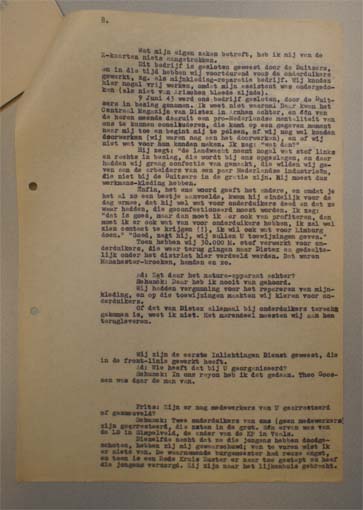
--8--
With regard to my own business, I didn’t mind the Z-cards.
Dit bedrijf is gesloten geweest door de Duitsers en in die tijd hebben wij voortdurend voor de onderduikers gewerkt, zg. als mijnkleding-reparatie bedrijf. Wij konden hier nogal vrij werken, omdat mijn assistent was ondergedoken (als niet van Arischen bloede zijnde).
Juni ’43 werd ons bedrijf gesloten, door de Duitsers in beslag genomen. Ik weet niet waar[om?] Daar kwam het Centraal Magazijn van Distex (Rijksbureau voor de Distributie van Textielproducten door de Handel) in Arnhem achter, en één van de heren meende daaruit een pro-Nederlandse mentaliteit van ons te kunnen concluderen, die komt op een gegeven moment naar mij toe en begint mij te polsen, of wij nog wel konden doorwerken (wij waren nog aan het doorwerken) en of wij niet wat voor hem konden maken. Ik zeg: „Wat dan?“
Hij zegt: „De landwacht neemt nogal wat stof links en rechts in beslag, die wordt bij ons opgeslagen, en daar hadden wij graag confectie van gemaakt, die wilden wij geven aan de arbeiders van een paar Nederlandse industrieën, die niet bij de Duitsers in de gratie zijn. Hij moest dus werkmans-kleding hebben.
Enfin, het ene woord geeft het andere, en omdat je het al zo een beetje aanvoelde, kwam hij eindelijk voor de dag ermee, dat hij wel wat voor onderduikers deed en dat ze waar hadden, die geconfectioneerd moest worden. Ik zeg: „Dat is goed, maar dan moet ik er ook van profiteren, dan moet ik er ook wat van voor andere onderduikers hebben. Ik zal wel zien contact te krijgen (1). Ik wil ook wat voor Limburg doen.“ „Goed,“ zegt hij, „we zullen u toewijzingen geven.“
Toen hebben wij 30.000 M stof verwerkt voor onderduikers, die weer terug gingen naar Distex en gedeeltelijk onder het district hier verdeeld werden. Dat waren K[?????stof broeken, hemden] en zo.
Ad: Zat daar het [?] achter?
Schunck: Daar heb ik nooit van gehoord.
Wij hadden vergunning voor het repareren van mijnkleding, en op die toewijzing maakten wij kleren voor onderduikers.
Of dat van Distex allemaal bij onderduikers terecht is gekomen, weet ik niet. Het merendeel moesten wij aan hen teruggeven.
Wij zijn de eerste Inlichtingen Dienst geweest, die in de frontlinie gewerkt heeft.
Ad: Wie heeft dat bij U georganiseerd?
Schunck: In ons rayon heb ik dat gedaan. Theo Goossen was daar de man van.
Frits: Zijn er nog medewerkers van U gearresteerd of gesneuveld?
Schunck: Twee onderduikers (geen medewerkers) zijn gearresteerd, die zaten in de grot. Eén ervan was van de L.O. in Simpelveld, de ander van de KP in Vaals.
Diezelfde nacht, dat ze die jongens hebben doodgeschoten, hebben zij (heeft men) mij gewaarschuwd; van te voren wist ik er niets van. De waarnemende burgemeester had [???], en toen is een Rode Kruis Zuster er naar toe gestapt en heeft die jongens verzorgd. Zij zijn naar het lijkenhuis gebracht.
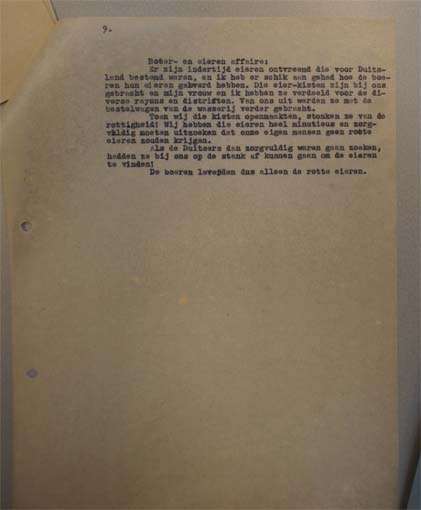
--9--
Boter- en eierenaffaire:
Er zijn indertijd eieren ontvreemd die voor Duitsland bestemd waren, en ik heb er schik aan gehad hoe de boeren hun eieren geleverd hebben. Die eier-kisten zijn bij ons gebracht en mijn vrouw en ik hebben ze verdeeld voor de diverse rayons en districten. Van ons uit werden ze met de bestelwagen van de wasserij verder gebracht.
Toen wij die kisten openmaakten, stonken ze van de rottigheid! Wij hebben die eieren heel minutieus en zorgvuldig moeten uitzoeken dat onze eigen mensen geen rotte eieren zouden krijgen.
Als de Duitsers dan zorgvuldig waren gaan zoeken, hadden ze bij ons op de stank af kunnen gaan om de eieren te vinden!
De boeren leverden dus alleen de rotte eieren.
Meer over deze „affaire“ leest u in het hoofdstuk Boter en eieren van „Het hele verhaal“.
.jpg/120px-Valkenburg_aan_de_Geul-Provinciaal_Verzetsmonument_op_de_Cauberg_(12).jpg)